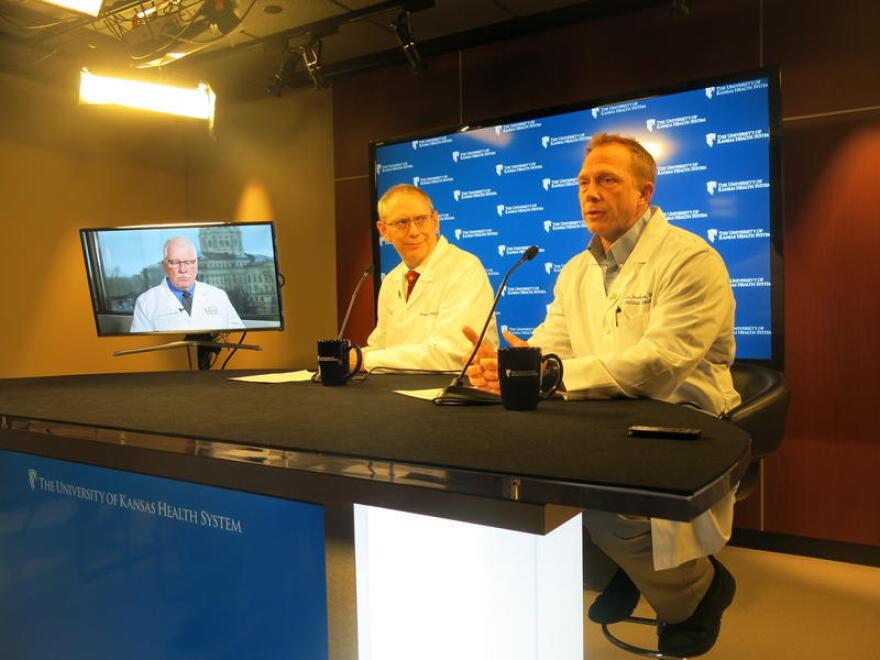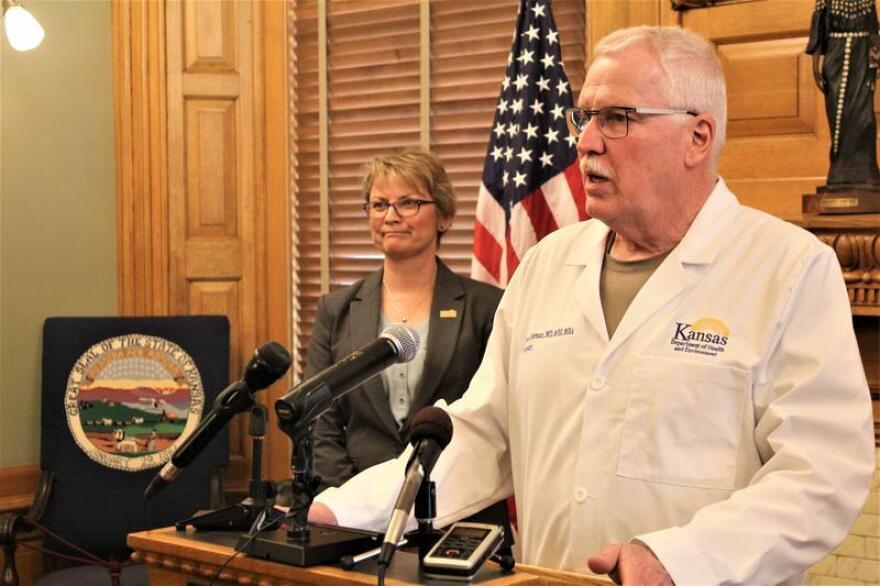As news broke over the weekend that the U.S. had the most confirmed COVID-19 cases in the world, some of the president’s top health officials debated whether it was possible to meet the May 1 deadline President Trump has proposed to reopen the U.S. economy.
On Monday, the director of the Centers for Disease Control and Prevention, Robert Redfield, reiterated the process would have to occur “community by community, county by county." As governors in the Northeast and the West established collaborative working groups to create plans to reopen their economies, Redfield made clear the U.S. has a long way to go before any kind of nationwide reopening would be possible.
Kansas City metro officials will meet at the end of the week to make some recommendations on a timeline for the stay-at-home order, and when they will allow non-essential businesses to reopen. The peak for COVID-19 cases in the metro is believed to be about two weeks away. Public health experts say relaxing restrictions too early after the peak is a mistake.
The Centers for Disease Control and Prevention has laid out several guiding principles to which communities should look as they navigate the delicate balance between putting people back to work, and causing a resurgence of COVID-19 cases.
KCUR asked several local public health officials to comment on how they are considering these principles.
Local public health officials must understand the spread of the virus.

Public health officials say the next two weeks are critical in understanding the spread of COVID-19 in the metro as a variety of models suggest the cases will level off around the end of the month. Even in the best case scenario, it will be another two weeks until officials want to begin a widespread reopening of the economy.
"You don't know if you've reached a peak until you can look backwards and say for the last ten or 14 days, we've had a continued downward slope to the line, fewer new cases," said Dr. Lee Norman, director of the Kansas Department of Health and Environment. "We'll feel much more comfortable [re-opening businesses] with a couple of weeks under our belt after our peak."
If the virus continues on its current trajectory, area hospitals will be able to accomodate them, officials say. Kansas City will not need to convert other spaces into critical care facilities as other cities have done.
“If our hospital is any indicator, we may be seeing a slowing of the infections," said Dr. Dana Hawkinson, medical director of infection control at the University of Kansas School of Medicine. "It still is too early to tell. With any luck or optimism, we can certainly start to see less critically ill and hopefully come out sooner than we had anticipated."
Public health infrastructures need to be strengthened.

One of the challenges for tracing the spread of the virus is that the majority of infected people do not show any of the COVID-19 symptoms. For that reason, it's important that social distancing and hygiene practices remain in place.
Dr. Norman said the best way to chart cases is much more widespread testing than officials in this area have done.
“It would be very reassuring to be able to do more community testing because we’ve done essentially no community testing broadly in the Midwest because we don’t have the materials to do it," Dr. Norman said. "We know a lot about [individual] cases and illnesses, but not so much about the community in terms of asymptomatic spread, who may be shedding the virus who is not showing any COVID-19 symptoms."
Prepare hospitals and other medical facilities.

A Centers for Disease Control and Prevention report released Tuesday indicates more than nine thousand health care workers have been infected with the novel coronavirus across the country. Local officials have been expressing concern for weeks that there has been a lack of protection for front line workers that puts doctors, nurses and EMT's at risk.
"We have to make sure we have enough personal protective equipment for our public health providers and investigators," said Dr. Rex Archer, director of the Kansas City, Missouri, Health Department. "If a lot of our health care providers are ill, even if we have the beds available in our hospitals, we won't be able to staff them."
When businesses and gathering places reopen, it's essential hospitals are prepared for what many consider an inevitable uptick in COVID-19 cases.
"We wouldn’t want to be working with full hospitals, full intensive care units and not be able to flex up should there be somewhat of a recurrence," said Dr. Norman of the Kansas Department of Health. "Also, all the money in the world doesn't buy swabs if they're isn't a sufficient quantity. The supply chain will be a key part of when we feel comfortable to open things up."
Foster a belief among Americans that it’s safe to scale back their isolation.

Kansas City metro officials announced stay-at-home orders early in the local outbreak, which they say, helped keep the virus in relatively low numbers in the area.
When they meet at the end of the week, officials will discuss the best way to open up Kansas City. They're all agreed it will happen gradually.
"If we relax the orders all at once, we'll just see an exponential increase in cases, hospitilizations and deaths," says Dr. Joseph LeMaster, public health officer with Johnson County, Kansas. "We can't just take everything off all at once. It has to be done in a staged manner, and it has to be done in such a way that all of the social distancing things we've been talking about can continue to have an effect as we go forward."
Knowing the virus will not be eliminated from the community when commercial activity begins, it's essential for residents to understand the only way to inhibit the spread is by keeping some of the social interaction practices in place. Smaller gatherings. Spaces between restaurant tables and bar stools. Fewer clients at a time in salons, barber shops and other small businesses.
"If we open up barber shops and salons, for example, we may say you can only have one person in every third chair, limit the number of people in the waiting room and show you are sanitizing the handles on chairs after each client," said Kansas City's health director Dr. Archer." We may very well say a bar can open, but it can only have one-fourth the normal occupancy under fire code. Then we have to enforce theses rules, so if a business is allowed to reopen and not doing what they're supposed to do we have to be able to close them down."
Laura Ziegler is a community engagement reporter at KCUR 89.3. You can reach her on Twitter @laurazig or by email at lauraz@kcur.org.



